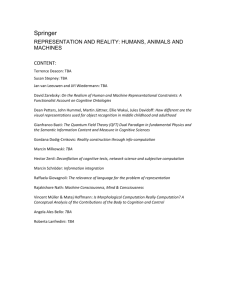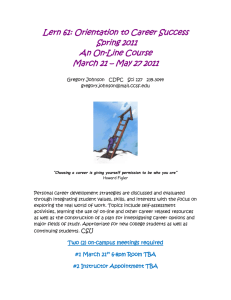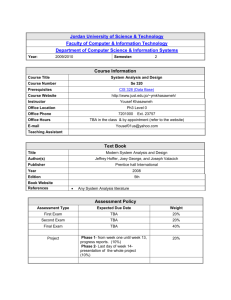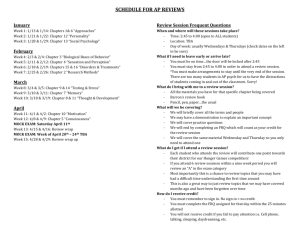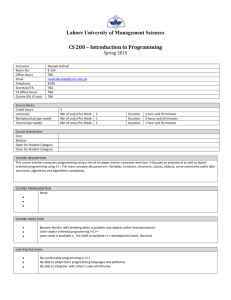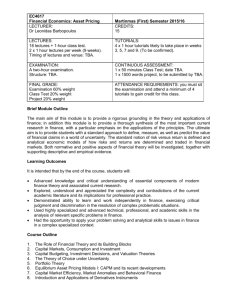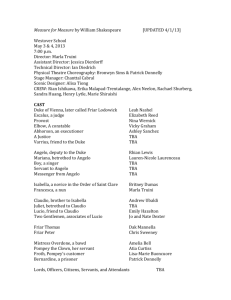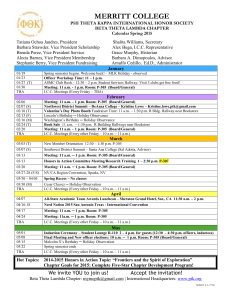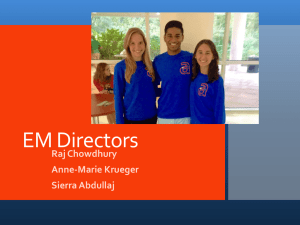CLCS 1103W Syllabus fall 2011
advertisement
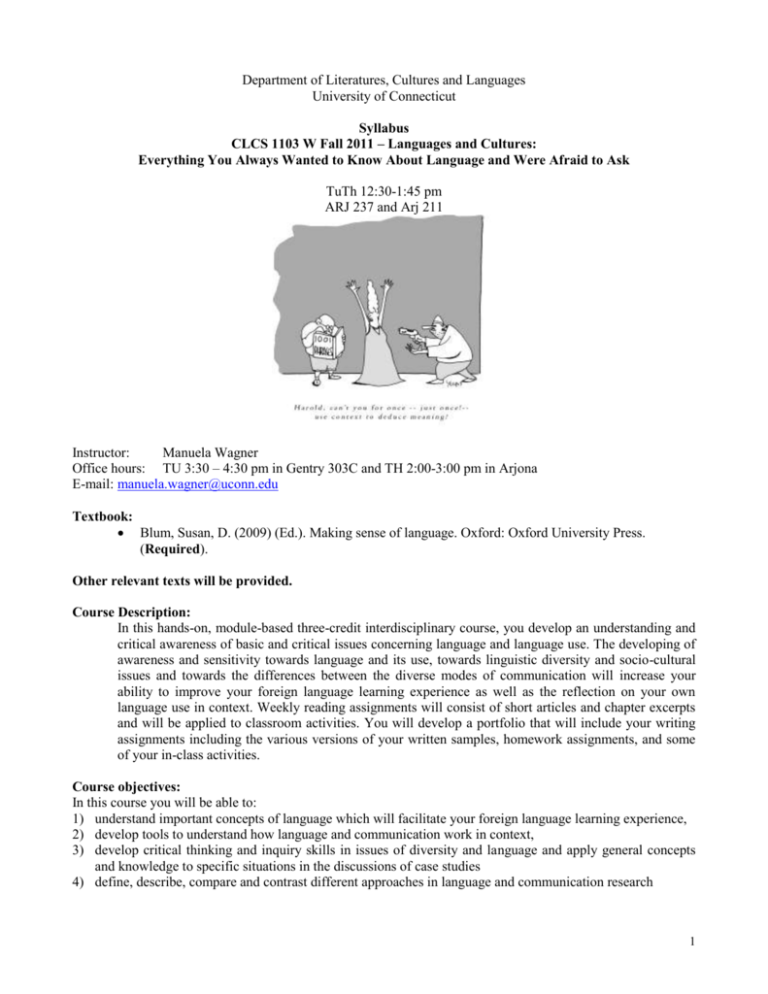
Department of Literatures, Cultures and Languages University of Connecticut Syllabus CLCS 1103 W Fall 2011 – Languages and Cultures: Everything You Always Wanted to Know About Language and Were Afraid to Ask TuTh 12:30-1:45 pm ARJ 237 and Arj 211 Instructor: Manuela Wagner Office hours: TU 3:30 – 4:30 pm in Gentry 303C and TH 2:00-3:00 pm in Arjona E-mail: manuela.wagner@uconn.edu Textbook: Blum, Susan, D. (2009) (Ed.). Making sense of language. Oxford: Oxford University Press. (Required). Other relevant texts will be provided. Course Description: In this hands-on, module-based three-credit interdisciplinary course, you develop an understanding and critical awareness of basic and critical issues concerning language and language use. The developing of awareness and sensitivity towards language and its use, towards linguistic diversity and socio-cultural issues and towards the differences between the diverse modes of communication will increase your ability to improve your foreign language learning experience as well as the reflection on your own language use in context. Weekly reading assignments will consist of short articles and chapter excerpts and will be applied to classroom activities. You will develop a portfolio that will include your writing assignments including the various versions of your written samples, homework assignments, and some of your in-class activities. Course objectives: In this course you will be able to: 1) understand important concepts of language which will facilitate your foreign language learning experience, 2) develop tools to understand how language and communication work in context, 3) develop critical thinking and inquiry skills in issues of diversity and language and apply general concepts and knowledge to specific situations in the discussions of case studies 4) define, describe, compare and contrast different approaches in language and communication research 1 5) critically evaluate multimodal communication by comparing written, oral, nonverbal language including new modes of communication such as internet, e-mail and chats. 6) develop writing skills by writing and revising 5-6 page writing assignments at the end of each of the three modules and by receiving extensive writing training 7) apply computer literacy skills through the use of technology which is a crucial component in every part of the course. Relationship to Goal of General Education at UCONN o Become articulate o Acquire intellectual breadth and versatility. o Acquire critical judgment o Acquire consciousness of the diversity of human culture and experience o Acquire a working understanding of the processes by which you can continue to acquire and use knowledge CA1 Criteria: This course fulfills the several Specific Criteria for Group I- Arts and Humanities: 1) Investigations and historical/critical analyses of human experience. 3) Investigations into the modes of symbolic representation. 4) Comprehension and appreciation of written, graphic and/or performance art forms. CA4 Criteria: As the General Education Requirements suggest, this course will encourage you to reflect upon and critically engage in discussions of matters dealing with language and diversity and thereby human experience. The course content and design will encourage you to explore your own language tradition within the larger world. The course meet s the following criteria: 1) Emphasize that there are varieties of human experiences, perceptions, thoughts, values, and/or modes of creativity. 2) Emphasize that interpretive systems and/or social structures are cultural creations. 3) Consider the similarities that may exist among diverse groups. 4) Develop an understanding of and sensitivity to issues involving human rights and migration. 5) Develop an awareness of the dynamics of social, political, and/or economic power in the context of any of the above four items. W Criteria: You will develop an e-portfolio which will include your writing assignments including the various versions of your written samples, your homework assignments, and your in-class activities. Peer and expert feedback of written assignments will provide you with the tools to engage in the writing process whose major component is effective revision. You will write three short response papers (1-3 pages each) and a 10-page final project paper. In every writing assignment, you will submit both the first draft and the final draft. All assignments should be written in double space, 12 pt and Times New Roman. You can choose one of the following writing styles: MLA, Chicago or APA. You will work on your final paper throughout the semester with your colleagues’ and my help. In order to pass this course, you must pass the ‘W’ component of the course. All writing assignments (except for the final paper) will be submitted in class, as hard copy only. For late submissions, 10 pts will be taken off per day. University Writing Center All UConn students are invited to visit the University Writing Center for individualized tutorials. The Writing Center staff includes talented and welcoming graduate and undergraduate students from across the humanities, social sciences, and sciences. They work with writers at any stage of the writing process, from exploring ideas to polishing final drafts. Their first priority is guiding each student's revisions, so they frequently provide a sounding board for a writer's ideas, arguments, analytical moves, and uses of evidence. They can also work with you on sentence-level concerns, but please note that they will not proofread for you; instead, they will help you become a better editor of your own work. You should come with a copy of the assignment you are working on, a 2 current draft (or notes if you are not yet at the draft stage), and ideas about what you want out of a session. Tutorials run 45 minutes and are free. You can drop in or make an appointment. For hours, locations, and more information, please go to writingcenter.uconn.edu. Academic Integrity In this course we aim to conduct ourselves as a community of scholars, recognizing that academic study is both an intellectual and ethical enterprise. You are encouraged to build on the ideas and texts of others; that is a vital part of academic life. You are also obligated to document every occasion when you use another’s ideas, language, or syntax. You are encouraged to study together, discuss readings outside of class, share your drafts during peer review and outside of class, and go to the Writing Center with your drafts. In this course, those activities are well within the bounds of academic honesty. However, when you use another’s ideas or language—whether through direct quotation, summary, or paraphrase—you must formally acknowledge that debt by signaling it with a standard form of academic citation. Even one occasion of academic dishonesty, large or small, on any assignment, large or small, will result in failure for the entire course and referral to Student Judicial Affairs. For University policies on academic honesty, please see UConn’s Responsibilities of Community Life: The Student Code and the Office of Community Standards: http://www.community.uconn.edu Students With Disabilities Students who think that they may need accommodations because of a disability are encouraged to meet with me privately early in the semester. Students should also contact the Center for Students with Disabilities as soon as possible to verify their eligibility for reasonable accommodations. For more information, please go to http://www.csd.uconn.edu/. Grade Criteria: Participation (including smaller projects) Essays Portfolio Exam Presentation 20% 40% 20% 10% 10% Grading scale: A AB+ B 94-100% 90-93 86-89 83-85 BC+ C C- 79-82 76-78 73-75 69-72 D+ D D 66-68 63-65 60-62 F 0-59 Additional Information: Talk to me immediately, should you have any problems or concerns with this course. Take advantage of my office hours or make an appointment with me. I want you to succeed and enjoy languages and cultures! 3 THIS COURSE DESCRIPTION AND SYLLABUS ARE SUBJECT TO CHANGE WITH PRIOR NOTIFICATION OF THE INSTRUCTOR Day August 31 September 1 September 6 September 8 September 13 Contents Introduction to course What is language? What did you always want to know? Language and communication Module 1: Concepts of language and foreign language learning Phonetics and phonology: Homophones, phonemes, consonants, vowels Introduction to projects Blum, chapter 1:Burling, R. (2005). Smiles, Winks, and Words. Morphology Projects Homework TBA Chapter 1 Reaction paper (1): My possible research project, 1 page Courses dropped after Sept 14 will have a “W” on the academic records Syntax Homework TBA Writing good academic English Peer-editing 2nd draft of reaction paper (1) Response paper (2) (about Blum, chapter 4), 1 page Homework TBA September 15 Blum: Chapter 4: Pinker, S. (1994). How Language Works. September 20 Non-linguistic means of communication (e.g. gestures, sign language, mediated communication) September 22 Activities for module 1 (online) September 27 Activities and review September 29 Exam and introduction to module 2 October 4 Module 2 Part 1: Language and Society Pragmatics 1: Intercultural communication, politeness and indirectness Edited version of response paper (2) October 6 Pragmatics 2: Apologies and compliments Scenarios Module 2 Part 2: Language and diversity Multilingualism Language in Education: What Educators Should Know About Language Language Policy 1 Language planning (world language education and bilingual education) Blum: Chapter 15: Battistella, E.L. (2005). Bad Language – Bad Citizens. Language Policy 2: Case Languages and power: Language and gender Blum: Chapter 30: O’ Barr, W. M. and Atkins, B.K. (1998[1980]). “Women’s Language” or “Powerless Language”? Video: Tannen, D. Homework TBA October 11 October 13 October 18 October 20 Homework TBA Peer-editing Exam Response paper (3) (1 article from your research project), 2-3 pages Homework TBA Bibliography for research project Edited version of response paper (3) 4 Review Module 2 Introduction to Module 3 Diversity of modes of communication: differences and similarities Spoken and Written language Module 3: Multimodal communication Diversity of modes of communication: Animal communication Debate: Bilingual education or topic of choice Homework TBA Homework TBA November 8 Mediated communication: New literacy practices Chapter 5: Stokoe, W. C. (1991). Signing and Speaking: Competitors, Alternatives, or Incompatibles? American Sign Language November 10 November 15 November 17 Case Module 3: Review In class time for project preparations and discussion of portfolio November 21-25 November 29 Thanksgiving Holiday Topic of your choice from one of the three modules Homework TBA December 1 Project presentations December 6 Project presentations December 8 Project presentations Final project paper Project presentation Project presentation Project presentation December 13-15 Portfolio conference (including edited version of final Project paper) October 25 October 27 November 1 November 3 Homework TBA Response paper (4) (part of your research paper), 2-3 pages Case preparation Homework TBA Edited version of response paper (4) 5
